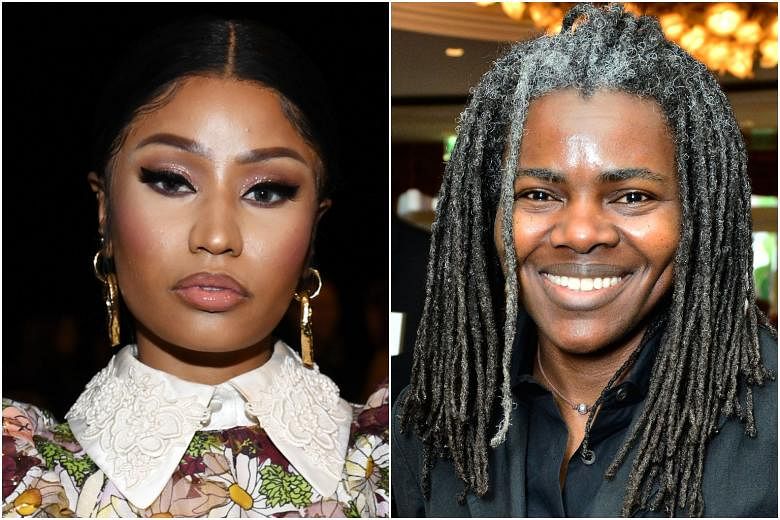LOS ANGELES (NYTIMES) - For months, the American entertainment industry's legal calendar had an intriguing item on the horizon: a copyright trial pitting Tracy Chapman, the revered and reclusive singer-songwriter, against the firebrand rapper Nicki Minaj.
But that trial is not to be.
Late last month, the parties agreed to a judgment of copyright infringement against Minaj, and a payment of US$450,000 (S$596,000) to Chapman, according to documents made public on Thursday (Jan 8) in federal court in California, where the case was being adjudicated.
Chapman, 56, sued Minaj, 38, for copyright infringement in late 2018 over a song called Sorry, which borrowed heavily from Chapman's Baby Can I Hold You, released in 1988.
The aspect of the case that drew the attention of legal scholars and entertainment litigators was that Minaj's song, which she recorded with the rapper Nas, was never officially released, although it had been played on the radio by Funkmaster Flex, a celebrity DJ on the New York radio station Hot 97.
Chapman accused Minaj of using Baby Can I Hold You without permission, which she said Minaj had asked for but was denied.
Yet Minaj argued that her creation of Sorry, even without a license from Chapman, was protected by the doctrine of "fair use" - an exception to copyright law that lets creators borrow copyrighted material under certain conditions.
Their dispute raised thorny questions for musicians and the companies behind them: Can artists be held liable for copyright infringement for works in progress? Do artists need permission even to experiment in the studio?
In September, Judge Virginia Phillips, of United States District Court in Los Angeles, sided with Minaj on the question of fair use.
In a summary judgment decision, Judge Phillips wrote that "uprooting" the common practice of letting artists experiment privately "would limit creativity and stifle innovation within the music industry".
But the judge allowed the case to go to trial over the question of how the song made its way to Funkmaster Flex.
Chapman's side alleged that Minaj had leaked it, and pointed to substantial correspondence between the two.
Minaj said she did not send the track, and Funkmaster Flex said that he had gotten it "from one of his bloggers," according to the judge's ruling.
If Minaj had leaked the song herself, or authorised its release through intermediaries, she may have been liable for significant penalties.
Court papers show that Minaj's lawyers made their offer of US$450,000, "inclusive of all costs and attorney fees incurred to date," on Dec 17, and that Chapman's team accepted it on Dec 30.
In a statement on Friday, Chapman said she was pleased with the outcome, "which affirms that artists' rights are protected by law and should be respected by other artists".
"As a songwriter and an independent publisher, I have been known to be protective of my work," Chapman added. "I have never authorised the use of my songs for samples or requested a sample. This lawsuit was a last resort."
When asked for comment about the conclusion of the case, Mr Peter Ross, a lawyer for Minaj, said simply: "We settled for one reason only. It would have cost us more to go to trial."

